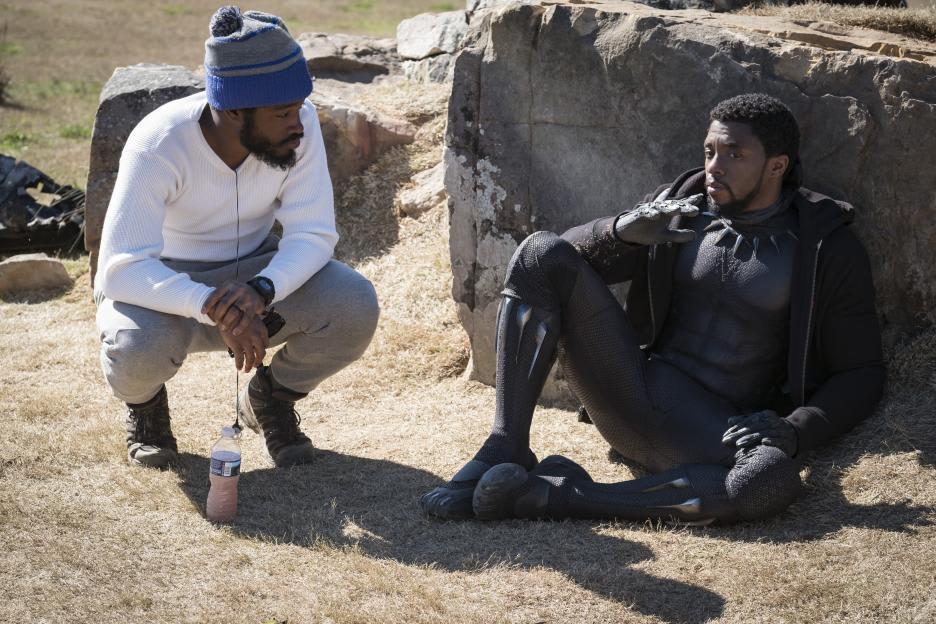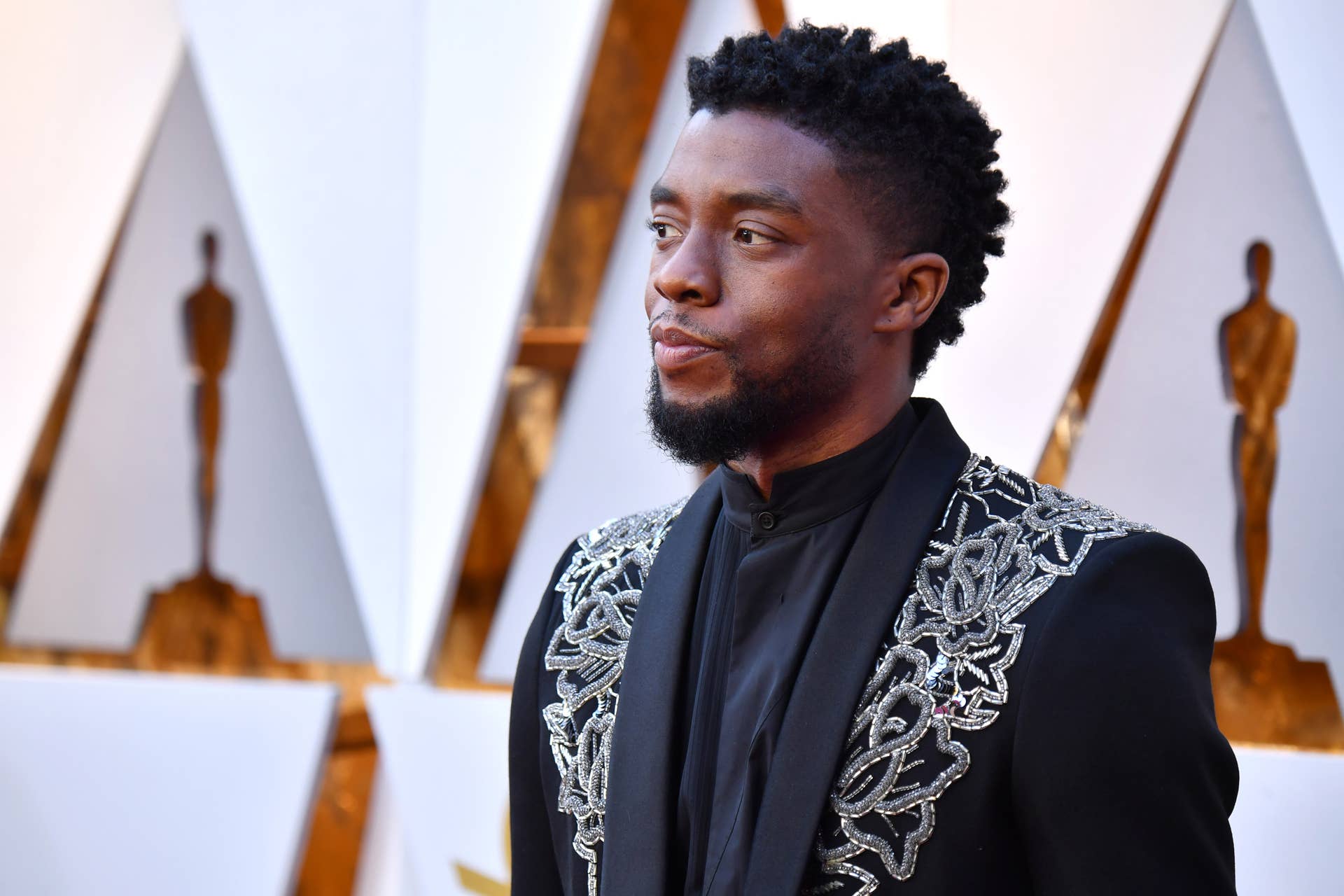
This should’ve been Chadwick Boseman’s decade. IMDB lists his first acting credit on the NBC drama Third Watch in 2003; by 2018 he had officially become a legend. As the eponymous superhero in Marvel’s Black Panther, Boseman was tasked with a remarkable and unfair responsibility. As No. 1 on the film’s call sheet, he was effectively ending the shameful drought heroes of color faced in silver screen adaptations. Whether that drought resumed rested on his performance—naturally, he hit it out of the park, with Black Panther accruing more critical and commercial acclaim than most movies in the genre had ever achieved and cementing himself as a leader among a new class of Black creatives and Hollywood at large.
This year has been intensely traumatic for a variety of reasons, but even still, losing Chadwick Boseman to a four-year battle with cancer—during which he filmed almost double that number of films—is a new level of unprecedented tragedy.
Black Panther is just one chapter in the actor’s career, which was tragically halted with him at the far too young age of 43, an age so young it feels unbelievable to type. It wasn’t his peak, but rather the starting point of a wave set to crest over the next several years and beyond. As T’Challa, a virtuous, super-strong warrior for justice with a cool costume and cooler gadgets, Boseman’s contribution to the culture is inestimable. Finally, a new hero for Black children to look up to and emulate. But by then, he had already portrayed so many of our culture’s heroes rooted in real life. Jackie Robinson, Thurgood Marshall, James Brown—whether by design or incidentally, Boseman had a knack for playing kings, both real and imaginary. It became a running lighthearted joke to guess which Black icon he would portray next, a scenario that would be an indictment of how stringently White Hollywood limits the playing field for Black actors if Boseman weren’t so damn good at it. Actors frequently covet biopics and blockbusters; few can say that they got to play three impactful and iconic Black men and took the superhero film genre by storm.
All of that said, the next phase of Chadwick Boseman’s acting career seemed to just be getting started.

You might trace these next moves back to 2017’s Message From the King, which Boseman both starred in and executive produced. Taken together with 2019’s 21 Bridges and Black Panther in between, it’s a period that saw him truly coming into his own. With him already a budding staple in dramatic roles, those two films proved that Chadwick Boseman was bankable and commanding without comic book tech or the power of IP. Boseman had been ready, but over the last few years, you could tell he was starting to grab it.
The trajectory of the post-MCU careers of some of the films’ biggest stars hasn’t really been charted yet. Robert Downey, Jr. and Scarlett Johansson were already “there” when they stepped into these iconic roles. Chadwick? The last few years have seen him clearly allowing himself to explore what he can really do as a performer, rather than just resting on the laurels of a hotly anticipated Black Panther sequel. He could bring the action by himself, mask off, but he could also bring voice to our people.
A striking throughline amid some of his most popular works is just how great Chadwick Boseman was at being good. In Da 5 Bloods, Spike Lee’s latest opus from earlier this year, Boseman’s Stormin' Norman is a beacon of moral fiber that shines long after his death, an angel on the shoulder to curb his fellow soldiers’ darker impulses. Boseman as Norm, waxing poetic about the Black struggle during the Vietnam War era, was powerful to behold. For all we’ve gotten to see from him on-screen, it’s fitting that a master craftsman like Lee would be the one to truly crown this king. In the hands of a lesser artist, though, good can be boring—Boseman made it aspirational. Think of how, across just three films in the sprawling MCU, T’Challa emerged as one of the franchise’s most revered characters, even as those around him had flashier roles buffered by their characters’ roguish (RDJ and pretty much everyone else) or devilish (Michael B. Jordan's Killmonger) charms.
Sitting with Boseman in 2018, ahead of Black Panther’s release, when excitement and uncertainty still hung in the air, he spoke on how he handled what can sometimes be perceived in these times as a burden of representation. “Of course you feel the initial pressure of it. But because you’re going from moment to moment, you’re not worried about the long term. So I don’t see any reason why I should change that at this moment. Because the expectations of, you know, what it’s gonna do to the industry and this, that, and the other is very dangerous. It’s very dangerous to do that. Because then you’re accepting this as the win. And this is not the win. The win will come as people bring their own things to it. And they’ll be inspired by it. And then, if they are, who knows what will happen?”
With his visionary director and co-captain Ryan Coogler by his side, he affirmed that role, and any he took before and would take after, was “just a step.” The 2020s should’ve been Chadwick Boseman’s decade to cement his legacy and expand an already storied career. But because of the steps he took, a generation found the inspiration he humbly sought to provide.
Wakanda Forever became the sign everyone gave Boseman after Black Panther shook the Earth. Maybe we need to change it to Chadwick Forever.




